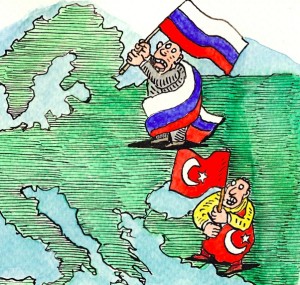Paul J. Saunders writes: Russia and Turkey have had a long, often tumultuous relationship, and some of their difficulties are not so distant. Before Moscow invaded and annexed Crimea earlier this year, Russian-Turkish relations had been on a dramatic upswing, with two-way trade reaching some $32 billion in 2013 (mostly Turkish imports of Russian natural gas) and Russia becoming Turkey’s No. 2 trading partner, behind Germany. Turkey had also emerged as Russia’s No. 1 trade partner in services, according to Russian Central Bank statistics, and the leading destination for Russian tourists (some 4 million in 2013), although recent advertisements on Russian state television are encouraging them to go to Crimea.instead.
Two years ago, Russia and Turkey agreed on visa-free travel for their citizens, allowing stays of one and later two to three months. On the political front, Russia and Turkey established the High Level Cooperation Council in 2010, which has met four times and may convene its fifth session in Turkey before the end of the year. Russian and Turkish officials appear to consult regularly on significant regional issues.
Although Moscow and Ankara do not always agree on how to proceed on issues, their communications appear to be far more regular and substantive than Putin’s exchanges with any other NATO member, especially after the alliance shut down the NATO-Russia Council earlier this year.
Perhaps most remarkable is that while Erdogan continues to press Putin about the
Crimean Tatars and their priorities, Turkey has abstained from Western efforts to
punish Moscow over Ukraine, maintaining a rather moderate tone. This stands in starkcontrast to the other governments most directly affected — namely, the Central
European NATO members — which have tried to push NATO and the United States
into doing more and which in many cases are seeking US and NATO troop
deployments on their territory.
The US-EU strategy for dealing with Moscow, such as it is, relies primarily on economic rather than military instruments. Turkey does not look particularly interested in lining up with the United States and the EU to confront Moscow. Turkey’s ambassador to Russia declared that his government would not impose sanctions on Russia if
asked by its allies. Earlier, in August, Turkey offered to increase food exports to Russia
after Moscow banned many European foodstuffs and suggested using national
currencies rather than dollars in bilateral trade. A month earlier, Ankara had inquired
about a free trade agreement with the Russia-led Customs Union. In early May, less
than two months after the Crimea annexation, state-owned Turkish Airlines announced
plans to reinstate flights there.
Russia’s relative success with Turkey likely extends beyond mere active diplomacy to also reflect a gradual, underlying shift in Ankara’s perception of its national interests and goals as its efforts to join the EU recede. Moscow sees Turkey as a key market and service provider. Looking ahead, there is still room for growth in bilateral trade. The combination of Russia’s energy resources and Turkey’s location straddling three continents creates
considerable synergies that could be appealing to Russia, not to mention that Turkey
provides state-owned Gazprom with yet another route around Ukraine to Europe.
Turkey also appears to share some of Moscow’s perspectives on the need to reform
the international financial system to accommodate emerging economies.
For now, Moscow and Ankara appear to have found a way to compartmentalize their
disagreements so they do not detract materially from their overall bilateral relationship.
With Erdogan having moved from being prime minister to president and former Foreign
Minister Ahmet Davutoglu taking over the premiership, Turkey seems likely to sustain
its current policy toward Moscow, and Russia seems likely to reciprocate.

